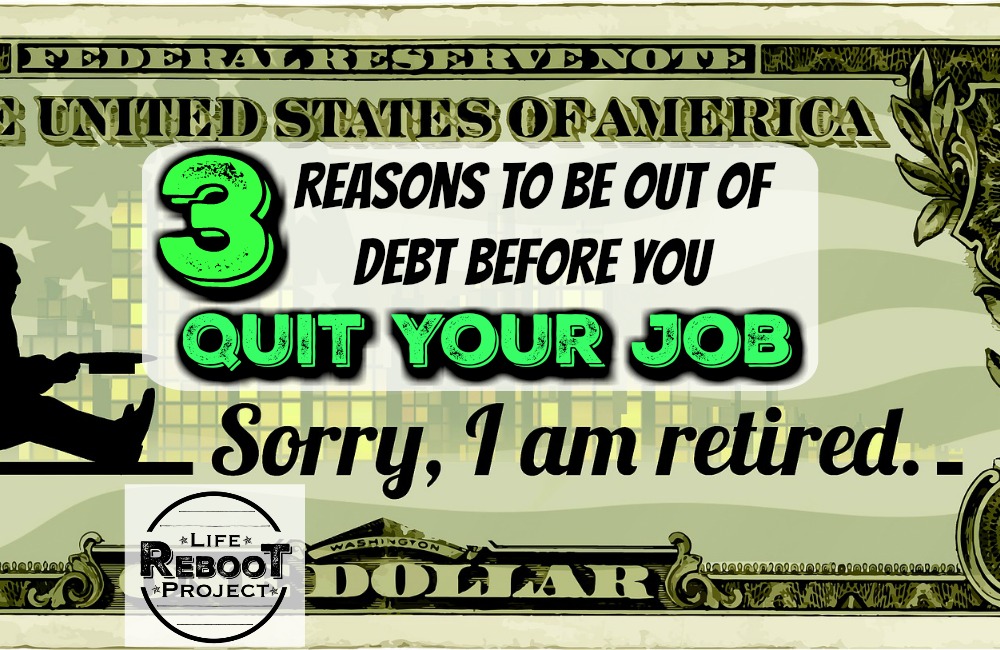
Getting out of debt before you quit your job will be probably the best advice you will ever get to keep you from relapsing back into the job marketplace. I was out of debt when I took my extended vacation (sabbatical) in the early 2000s. Since then, I have heard too many horror stories of people having to go back into the workplace after they had quit their jobs. The main reason? Not being prepared enough and too many unexpected expenses.
The last thing you are going to want to do is to head back to work, even for a part-time job, once you’ve declared yourself free. That has got to sting. Well, I do have a little experience with this myself. Eating crow doesn’t taste very good. It was around 2011 or 2012. I had been marketing on the internet for a while and making a little bit of money, but I was better at helping small local businesses get their online presence better.
It was a particularly frustrating time at work, and I struck up a deal with my boss to go part-time. I worked for about four months part-time helping other businesses. I ran into the wrong string of clients. Then, ran into an even worse time of not being able to find clients. Work was a busy time, so I ended up putting in more time than part-time. At the end of four months, I decided to eat crow and ask to go back full-time.
My boss had become a friend, and I think he understood what I was going through. He agreed to let me back full-time. The sting of failure was harsh. I do owe him a lot because it would have been much worse had he said no. I would have been out job hunting to find another full-time gig.
The sting was so severe, that I stayed off the internet marketing merry-go-round for quite a while. Defeat can hurt you pretty badly in ways you never really imagined. I think that defeat made me stronger and more resilient. Anyway, here are three reasons below to help keep you out for good when you finally get out.
Out of Debt Rule #1; Your income will fluctuate more than you have expected
There is nothing stable when working for yourself. When you have a job with a steady paycheck, the business you are working for shields you from these fluctuations. That’s one reason why owning a business can be very stressful. Cutting your overhead (your monthly operating costs in business terminology) is the best way to cushion you from these fluctuations. If you have a bunch of monthly payments you are making, you will be more vulnerable to feeling the squeeze when times get tight.
Eliminate your payments on debt before you quit your job. Make your monthly overhead only include the costs you are spending every month.
Out of Debt Rule #2; Your estimated number will usually be lower than it
Everyone will have a number in their head on what it will cost them to live without a job. This is why it is so important to track your monthly expenditures and have a budget. You should know exactly what you are spending at all times and know how much it will cost to leave your job. But, even if you seem to have a good idea, some things will get forgotten about, and your monthly costs will be higher than you expect. This is why it is so important to be out of debt.
I usually see people underestimate the government’s take on taxes and how much health insurance will cost. Having debt on top of these unexpected expenses will push your monthly overhead out of reach. The best thing you can do is to create a reasonable budget, pay down your debt, and do a ton of research on what it will cost you to run your own business. Get estimates on insurance. Research tax withholdings. Also, don’t forget you will probably need to start paying a quarterly estimated tax when you are self-employed. Regular jobs cushion us from these fluctuations.
Out of Debt Rule #3; Need to be ready for unexpected expenditures
It always seems when things go wrong, they go wrong in batches. The car breaks down, the refrigerator you’ve had for twenty years gives up, and the dog needs to go to the vet, all in the same week. These things can be a killer when you are also self-employed with a fluctuating income and making debt payments at the same time. Paying down your debt first will prepare you for these monthly blows.
The other thing I highly recommend is having a sizeable monthly nest egg to fall back on. This will be the most significant cushion you will have for those unexpected monthly blows. You will have pitfalls along your journey as you start to claw your way out of the job life. These are just three reasons why I believe being debt-free is an absolute must when you go to leave your job. You will have other pitfalls of your own to deal with for a while when you first break free. I’m just trying to give you a heads-up to make your time go a little smoother.
Have you ever been caught by surprise by unexpected expenses? Tell about them in the comments below. If you’d like to sign up for my mailing list, you’ll find it in the sidebar to the right.
Be safe,
Kevin

